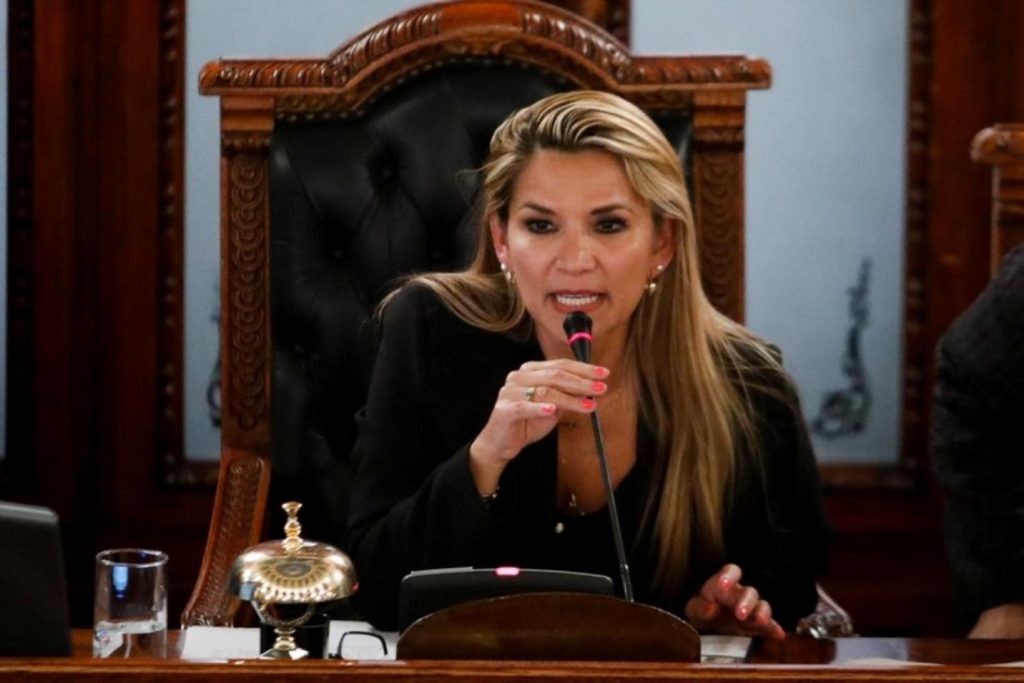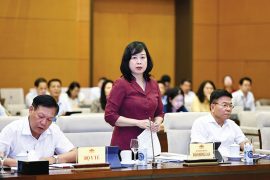Bolivian opposition senator Jeanine Áñez has declared herself interim president of the South American country following Evo Morales’ resignation.
Ms Áñez said she was next in line under the constitution and vowed to hold elections soon.
Her appointment was endorsed by Bolivia’s Constitutional Court.
Lawmakers from Mr Morales’ party boycotted the session, and the former president branded Ms Áñez “a coup-mongering right-wing senator”.
Mr Morales has fled to Mexico, saying he asked for asylum there because his life was in danger.
He resigned on Sunday after weeks of protests over a disputed presidential election result. He has said he had been forced to stand down but had done so willingly “so there would be no more bloodshed”.
How did the senator become interim president?
Ms Áñez, 52, is a qualified lawyer and a fierce critic of Mr Morales. She was previously director of the Totalvision TV station, and has been a senator since 2010, representing the region of Beni in the National Assembly.
As the deputy Senate leader, Ms Áñez took temporary control of the body on Tuesday after Bolivia’s vice-president and the leaders of the senate and lower house resigned.
That put her next in line for the presidency under the constitution.
The parliamentary session to appoint Ms Áñez was boycotted by lawmakers from Mr Morales’ leftist Movement for Socialism party, who said it was illegitimate.
“Before the definitive absence of the president and vice president… as the president of the Chamber of Senators, I immediately assume the presidency as foreseen in the constitutional order,” Ms Áñez said to applause from opposition lawmakers.
Bolivia’s highest constitutional court backed her assumption of power.
Writing on Twitter from Mexico, Mr Morales condemned the “sneakiest, most nefarious coup in history”.
How did we get here?
Mr Morales, a former coca farmer, was first elected in 2006, the country’s first leader from the indigenous community.
He won plaudits for fighting poverty and improving Bolivia’s economy but drew controversy by defying constitutional limits to run for a fourth term in October’s election.
Pressure had been growing on him since contested election results suggested he had won outright in the first round. The result was called into question by the Organization of American States, a regional body, which had found “clear manipulation” and called for the result to be annulled.
In response, Mr Morales agreed to hold fresh elections. But his main rival, Carlos Mesa – who came second in the vote – said Mr Morales should not stand in any new vote.
The chief of the armed forces, Gen Williams Kaliman, then urged Mr Morales to step down in the interests of peace and stability.
Announcing his resignation, Mr Morales said he had taken the decision in order to stop fellow socialist leaders from being “harassed, persecuted and threatened”.
He fled to Mexico as unrest erupted on the streets of the Bolivian administrative capital, La Paz, with angry supporters of the socialist leader clashing with security forces.
After arriving in Mexico City on Tuesday, he thanked Mexican President Andres Manuel Lopez Obrador, whom he credited with saving his life.
“While I have life I’ll stay in politics, the fight continues. All the people of the world have the right to free themselves from discrimination and humiliation,” he said.
Source: BBC





Comments are closed.